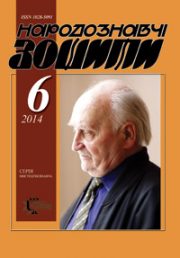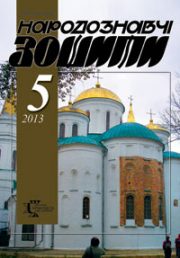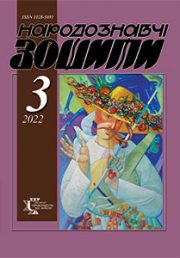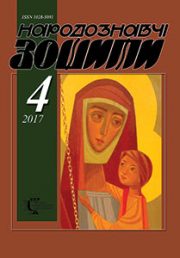The Ethnology Notebooks. 2021. # 1 (157), P. 40—45
УДК [801.81:811.161.2’38]:001.891-042.2
DOI https://doi.org/10.15407/nz2021.01.040
Yuliia SOBORA
- ORCID ID: https://orcid.org/0000-0001-9725-4813
- Aspirant,
- Rylsky Institute of Art Studies, Folklore and Ethnology,
- Str. Hrushevskoho, 4, Kyiv, Ukraine, 01011
- e-mail: yulitasubr@gmail.com
THE «CONCEPT» AND THE PROBLEMS OF THEIR COMPARATIVE ANALYSIS IN FOLKLORE
Introduction. The notion «concept» remains rather disputable in contemporary linguistic and literary studies since there is still no unanimous scientifically justified interpretation.
Problem Statement. A concept is a concrete fixed and structured notion that emerges in the process of cognitive activity. In general, a concept may be any word that has a distinctly intangible, often abstract meaning and performs a nominative function. The relevance of researching the notion «concept» and the problems of their comparative analysis in folklore studies is determined by the fact that there are no clear criteria and factors for classifying concepts and determining their characteristic and differential features.
Purpose. The object of the research is the notion «concept» and modern approaches to its interpretation in linguistics, while the subject of the investigation is the concrete means of expressing the concept in folklore studies, where it is an artistic, informative and cognitive formation at the same time, since it is capable of not only expressing the essence of folk-poetic notions but also transforming and expressing specific images on the basis of associative links.
Methods. The author of the article employs mainly comparative-typological and historical-cultural methods.
Results. The concept is a complex structure that constitutes a synthesis of the individual author’s understanding of the tradition of its common usage, as well as with the universal, primordial or mythological world model. The determined concepts need to be compared and named depending on the sphere of their functioning, social perception, historical discourse, cognitive development, etc.
Conclusion. Based on an analysis of academic sources, it has been found that the most commonly used concepts in folklore include «love», «death», «longing», «laughter», «fear», «faith», «hope», «dream», «evil», etc. Concepts in the narrow sense exist in small folklore genres (paremias) and are limited by specific historical and social boundaries, whereas concepts in the structure of the song and calendar-ritual oral-poetic art are expressed at the levels of consciousness, worldview, historical notions, transformations, social stratification, cognitive and perceptual comprehension, etc.
Keywords: concept, conceptual sphere, folklore, analysis, understanding.
REFERENCES
- Selivanova, O. O. (2008). Modern Linguistics: Directions and Problems. Poltava: Dovkillia [in Ukrainian].
- Zhabotinskaya, S. A. (2009). Concept / domain: matrix and network models. Kultura narodov Prichernomoria (vol. 168, pp. 254–261) [in Russian].
- Kubryakova, E. (1996). A Concise Dictionary of Cognitive Terms. Moscow [in Russian].
- Stepanov, Yu. S. (1997). Constants: Dictionary of Russian Culture. Research Experience. Moscow: Yazyki russkoy kultury [in Russian].
- Grigoryev, A. A. (2003) Cultural sense of the concept: dissertation. Moscow [in Russian].
- Sadovnikova, H. V. (2014). The relation between categories of concepts, concepts and meanings in cognitive terminology. Visnyk Kyivskoho natsionalnoho linhvistychnoho universytetu (vol. 1, pp. 156–164) [in Ukrainian].
- Miahkota, I. (2011). From the history of the formation of Ukrainian folklore terminology. Visnyk Natsionalnoho universytetu «Lvivska politekhnika». Seriia «Problemy ukrainskoi terminolohii (vol. 709, pp. 96–102) [in Ukrainian].
- Maslova, V. A. (2011). Introduction to cognitive linguistics. Moscow: Flinta [in Russian].
- Sternin, I. A. (1981). Psychologically the real meaning of a word and its study. Psikholingvisticheskiye issledovaniya v oblasti leksiki i fonetiki. Kalinin (pp. 116–122) [in Russian].
- Superanskaya, A. V., Podolskaya, N. V., Vasilyeva, N. V. (1989). General Terminology: Theory Questions. Moscow: Nauka [in Russian].
- Emer, Yu. A. (2010). Folklore concept: a genre-discursive aspect. Vestnik Tomskogo gosudarstvennogo universiteta. Ser. Filologiya (vol. 1 (9), pp. 91–99) [in Russian].
- Makkormak, E. (1990). Cognitive Theory of Metaphor. Teoriya metafory. Moscow: Progress (pp. 358–386) [in Russian].
- Ivanovska, O. (2012). Ukrainian folklore: semantics and pragmatics of traditional meanings. Kyiv: Ekspres-Polihraf [in Ukrainian].
- Kuzmenko, O. M. (2018). Folklore concept: definition of the term, structural parameters and types. Narodoznavch zoshyty (vol. 6 (144), pp. 1439–1447) [in Ukrainian].
- Semenenko, V. P. (2009). The ideal image of a girl in Ukrainian folklore (based on folk poems). Literatura. Folklor. Problemy poetyky (vol. 32, pp. 376–383) [in Ukrainian].
- Kononenko, V. (2004). Concepts of Ukrainian Discourse. Kyiv-Ivano-Frankivsk [in Ukrainian].







